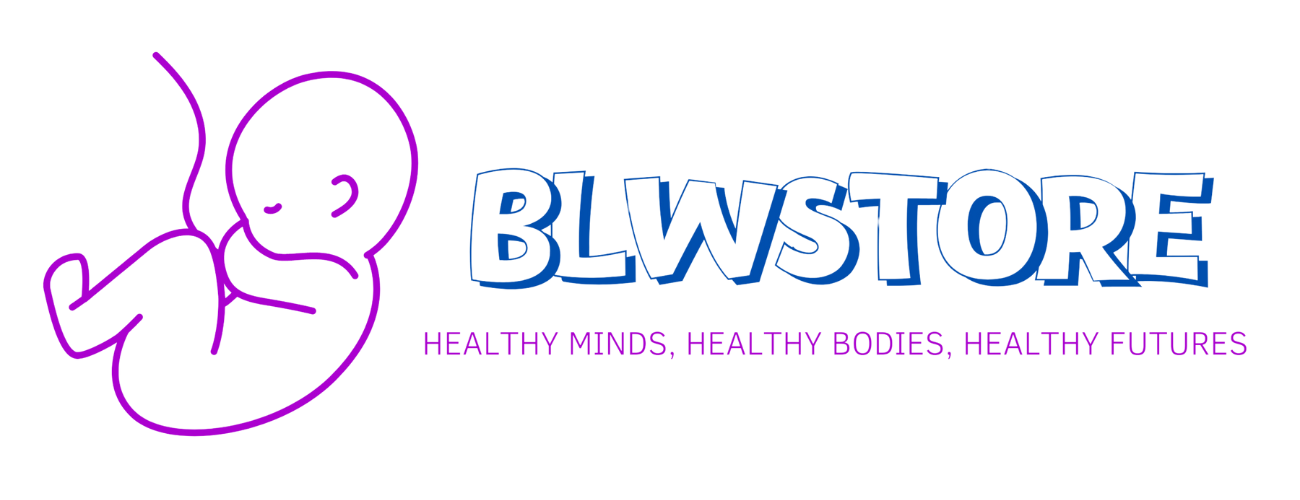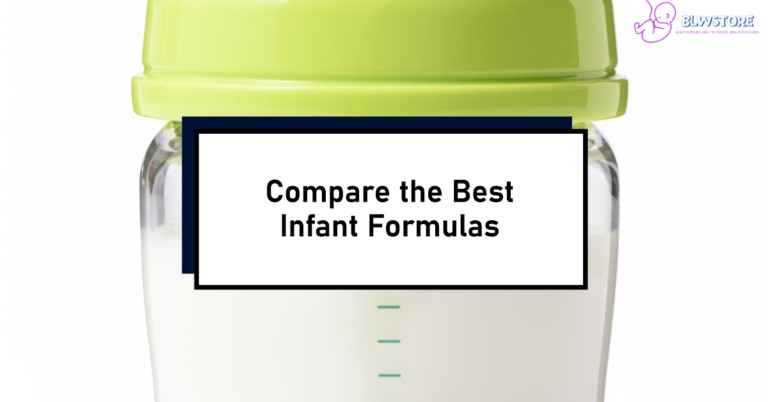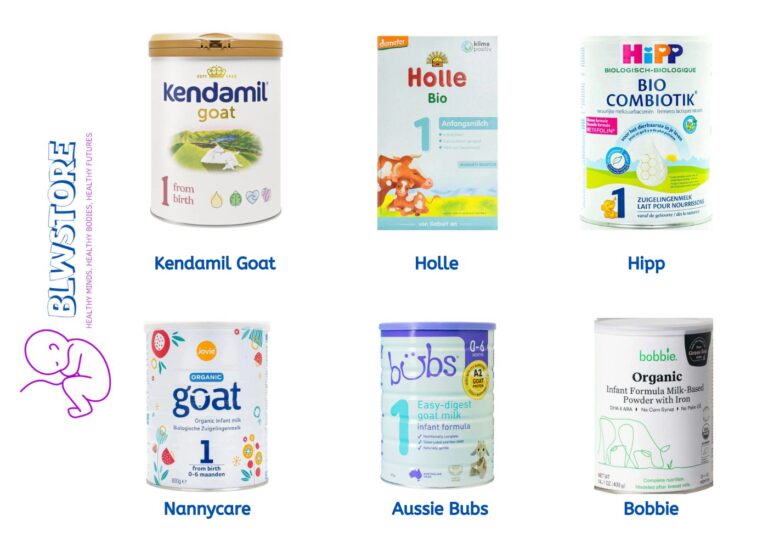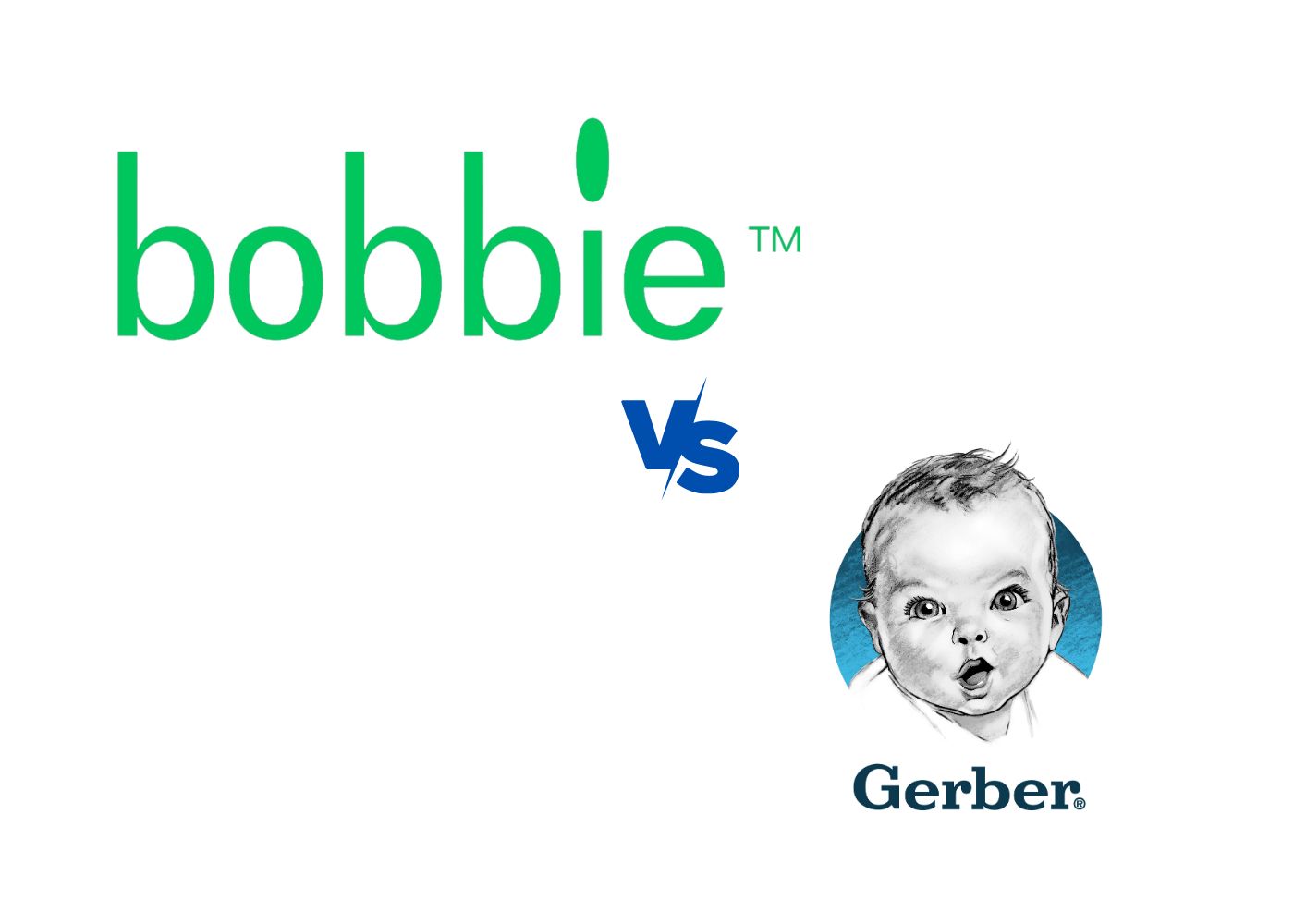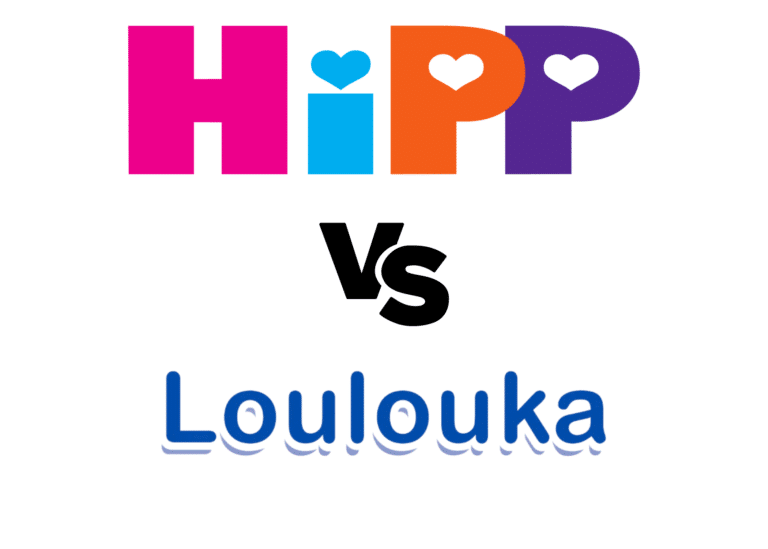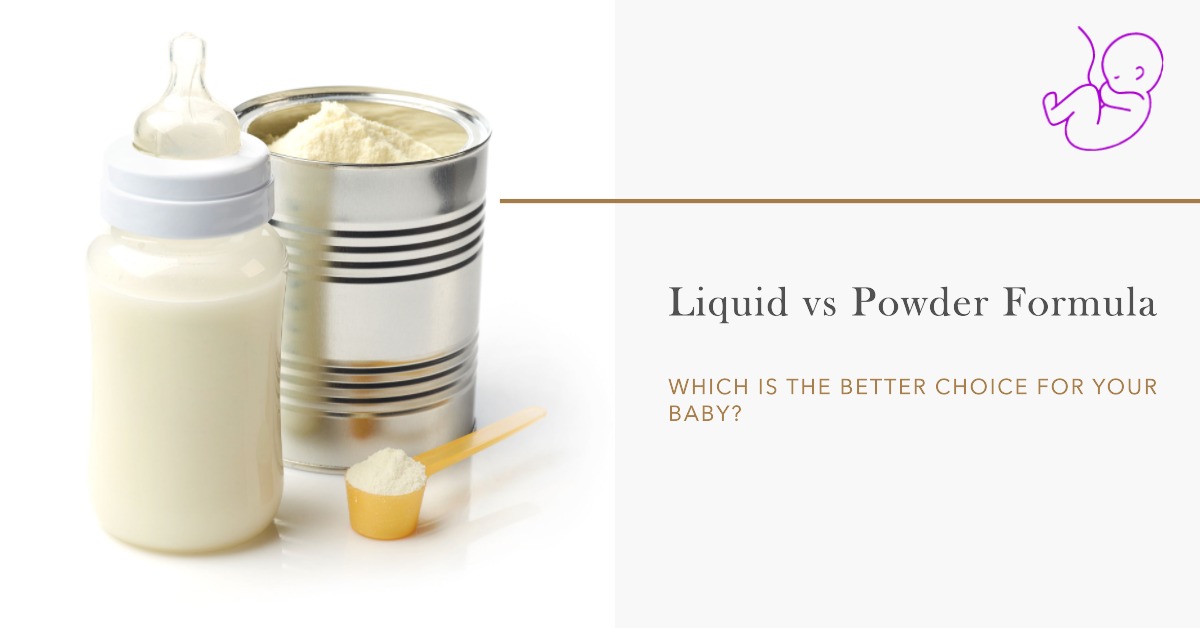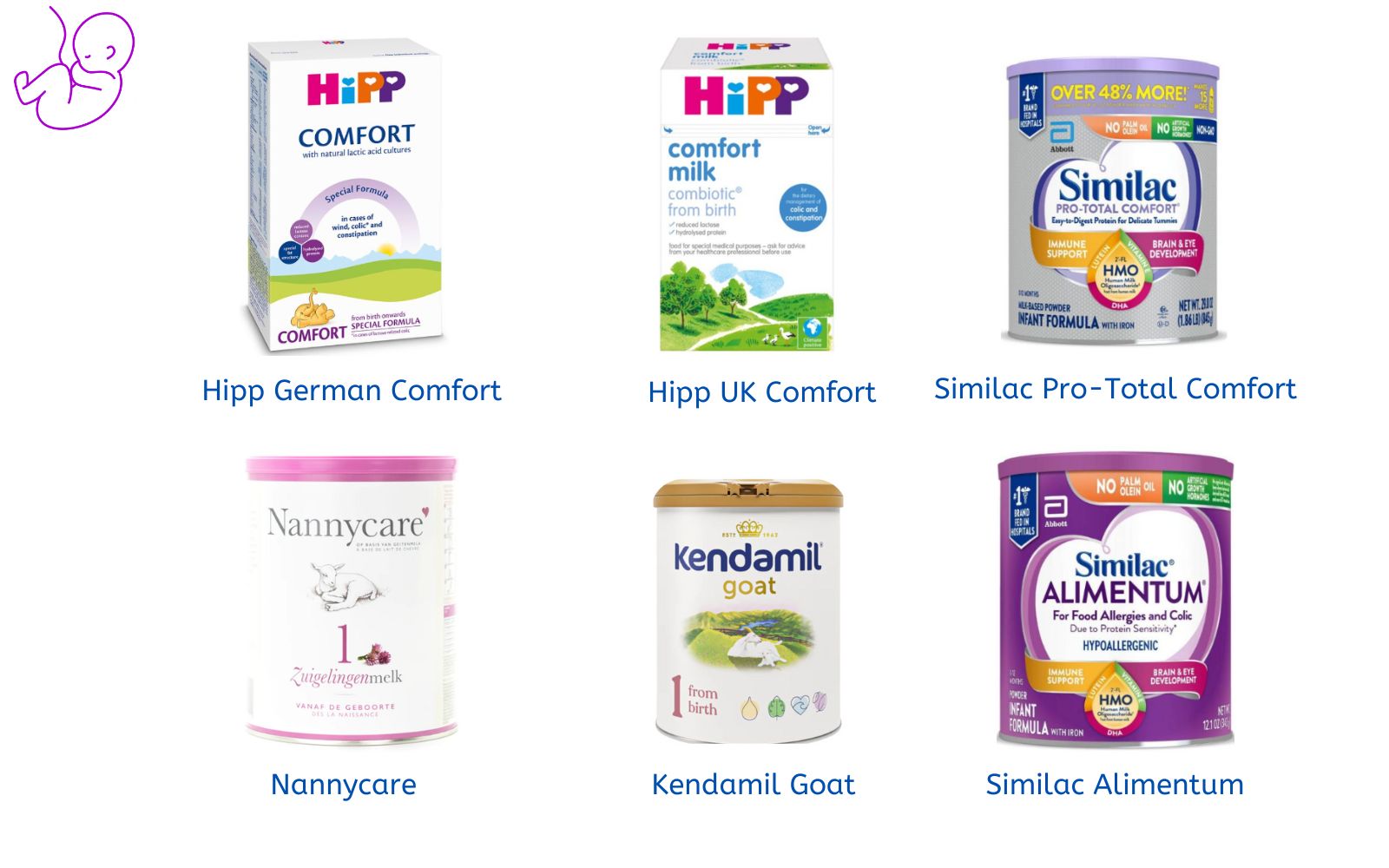
Although lactose is the best type of carbohydrate in infant formula, a small percentage of infants have difficulty digesting it properly.
Fortunately, many infant formulas nowadays are explicitly designed to manage this need.
After reviewing and analyzing hundreds of baby formulas, we have compiled the best list of low-lactose and lactose-free formulas in 2024.
In this article, you will find the best low-lactose and lactose-free baby formulas on the market.
Let’s get after it!
Related reads: Best Formulas Without Cow’s Milk Protein | Best Organic Formulas
*We have not included any “buy here or purchase links” since we want this information to be as transparent and wholesome as possible. We are not trying to sell you anything. We want to help, for real.
A Bit of Help if Needed
If you have no idea where to start or what kind of needs your baby might have, we recommend you follow this roadmap:
- Choose a formula that is as close to breast milk as possible.
- If your baby doesn’t react well, taking him to the pediatrician would be the next step, but if you can’t, look at the symptoms of lactose intolerance and cow’s milk allergy and choose a formula that fits.
- If it is unclear what it is, choose a formula with reduced lactose content, as close to breast milk as possible (Hipp Comfort, for example, or Bobbie Gentle).
- If he doesn’t react well, switch to a formula with no lactose, such as Similac Pro-Total Comfort.
- If that still doesn’t work, use a hypoallergenic formula, such as Similac Alimentum.
Podium of the Best Formulas Without Lactose
For parents who want fast answers, these are the three best formulas for lactose-sensitive and lactose-intolerant babies.
We have added a goat milk formula because, in some cases, babies sensitive to the lactose of a cow’s milk-based formula don’t have issues if it’s made with goat’s milk.
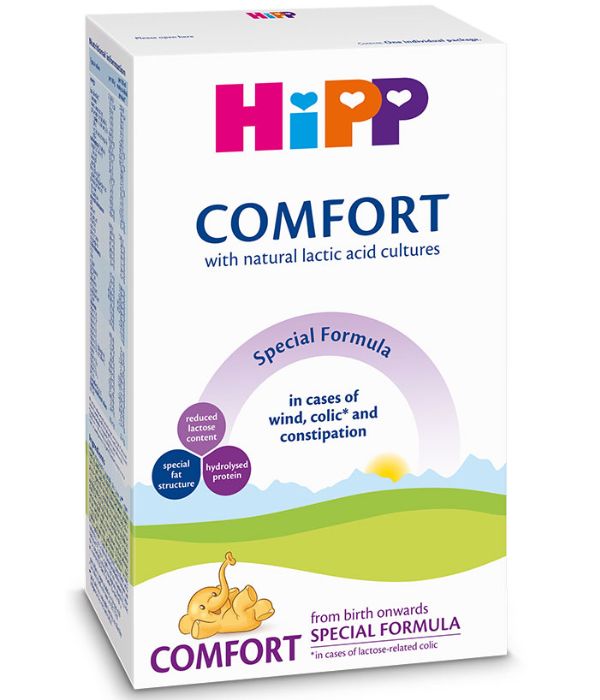
Best Low-Lactose: Hipp Comfort
The best for lactose sensitivities. Organic, pre and probiotics and closest to breast milk.
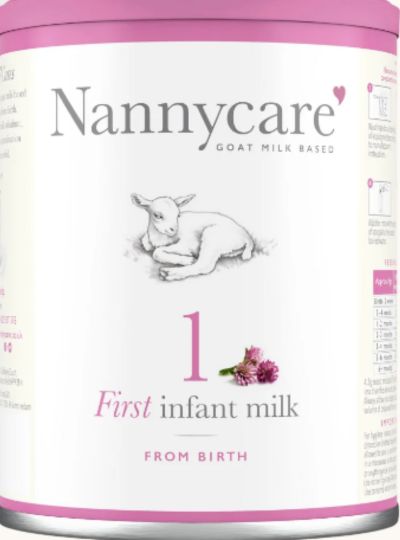
Best Goat Milk Formula: Nannycare
Whole milk, easier to digest than cow’s milk formula, prebiotics… amazing option.
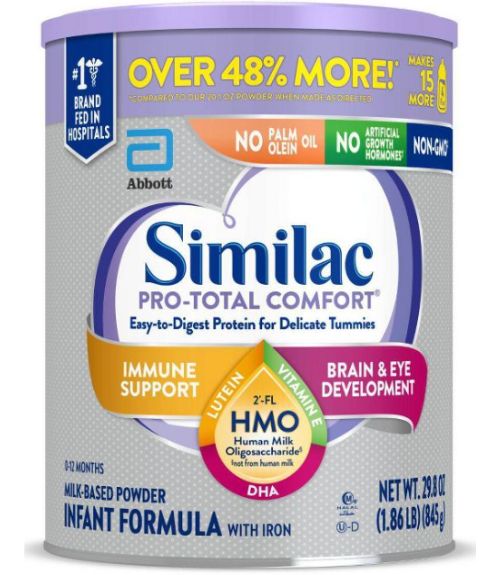
Best Lactose-Free: Similac Pro-Total Comfort
The best lactose-free formula we have found. HMOs, maltodextrin (not corn syrup), partially hydrolyzed milk for better digestibility.
How to know if your baby has lactose intolerance or cow’s milk protein allergy
The symptoms can sometimes overlap, but there are some key differences:
Look at the Timing.
- Lactose Intolerance: Symptoms usually appear within a few hours after feeding milk or dairy products.
- Cow’s Milk Protein Allergy: Symptoms can appear immediately or up to a few hours after consuming milk.
Check the Symptoms.
- Common for Both: Diarrhea, gas, and bloating.
- Lactose Intolerance: Mostly digestive problems like diarrhea, gas, and maybe a bit of fussiness.
- Cow’s Milk Protein Allergy: Along with digestive issues, watch for more severe reactions like skin rashes, hives, eczema, vomiting, or respiratory problems like wheezing or a stuffy nose.
Severity.
- Lactose Intolerance: Uncomfortable but not too dangerous.
- Cow’s Milk Protein Allergy: Can be more serious, especially if there’s a strong allergic reaction like difficulty breathing or severe skin reactions.
Lactose Alternatives: Maltodextrin vs Corn Syrup Solids
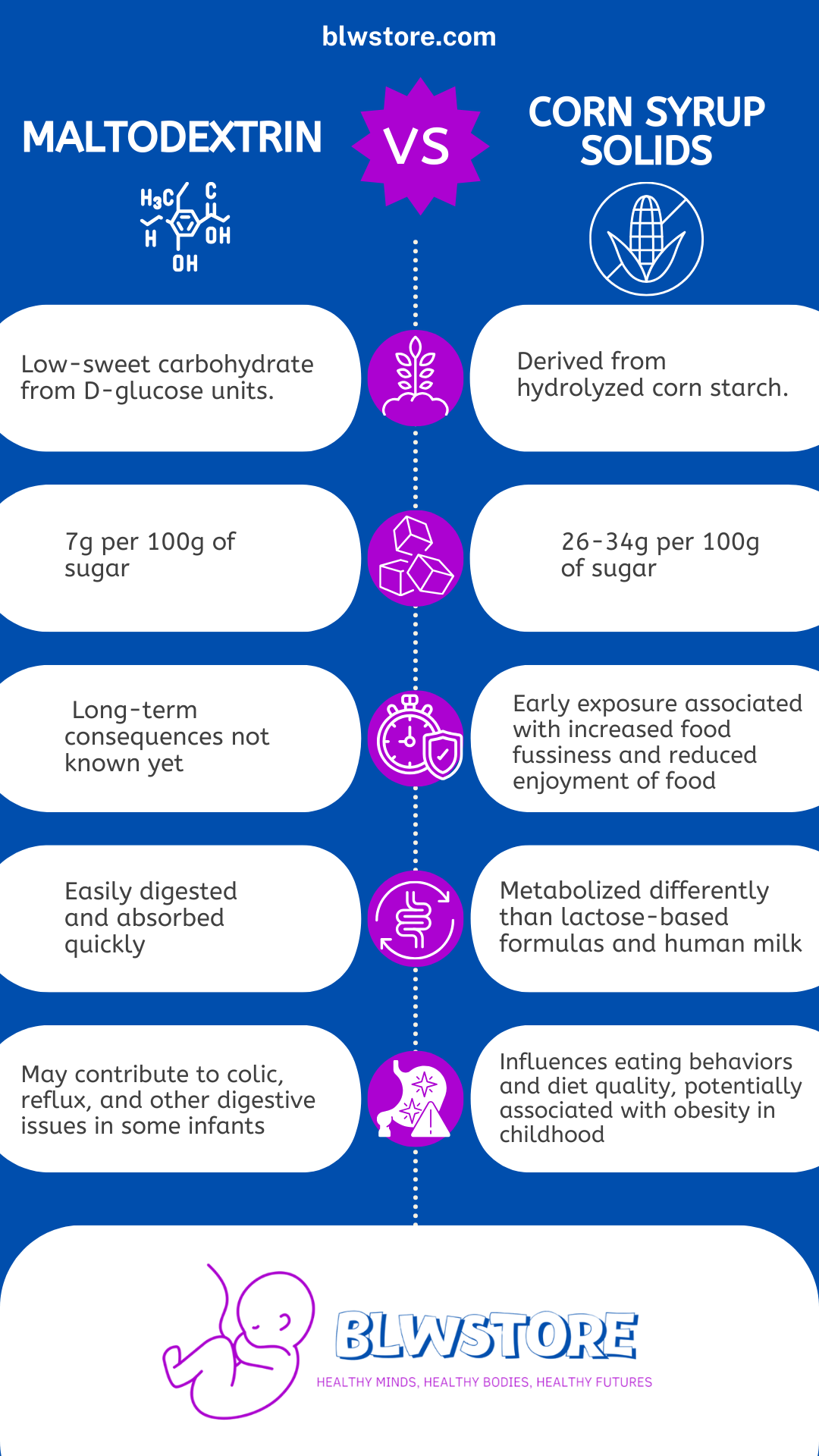
How We Chose the Formulas in This Article | Our Criteria
Our criteria for choosing the formulas in this article is as follows (from most important to least important):
- All formulas must be low-lactose or lactose-free
- Inclusion of prebiotics (GOS or HMOs if possible)
- Use of maltodextrin instead of corn syrup solids if possible
- Avoidance of Soy Oil if possible
- Use of organic ingredients
- Inclusion of MFGM
Our goal is to offer you the healthiest options for your baby. We’d happily offer our baby any formulas in this article.
What Types of Formulas for Sensitive Babies are There?
Hypoallergenic Formulas: These are designed for infants who are allergic to the proteins in cow’s milk. They come in two types:
- Partially Hydrolyzed Formulas: In these formulas, the protein is broken down into large pieces, which are usually easier to digest than whole proteins. However, they still contain lactose and may not be suitable for babies with a severe milk protein allergy.
- Extensively Hydrolyzed Formulas: These contain proteins broken down into much smaller sizes, making them ideal for babies with a diagnosed milk protein allergy. They are less likely to provoke an allergic reaction.
Low Lactose and Lactose-Free Formulas:
- Low Lactose Formulas: These formulas have reduced lactose content. They can benefit babies who have difficulty digesting lactose. However, they still contain small amounts of lactose.
- Lactose-Free Formulas: These are entirely devoid of lactose and are suitable for babies with lactose intolerance. They often contain a different type of sugar to replace lactose.
Goat Milk Formulas: An alternative to cow’s milk formulas, goat milk formulas contain less lactose and are often easier for babies to digest. The protein in goat milk differs from cow’s milk, making it a suitable option for some infants who have sensitivities or mild reactions to cow’s milk. However, goat milk formulas are not suitable for infants with a confirmed cow’s milk protein allergy, as the proteins are similar enough to potentially cause a reaction.
Best Low-Lactose Formulas
1. Hipp Comfort.

HiPP Comfort is an organic, hydrolyzed formula designed for sensitive tummies, promoting easier digestion and reducing colic.
Why we chose it.
HiPP Comfort has earned its place on our list due to its commitment to providing a gentle formula for babies with sensitive digestive systems.
The key ingredient that sets this formula apart is its hydrolyzed whey protein. By breaking down the milk protein into simpler forms, HiPP has created a product that can significantly alleviate gastrointestinal discomfort and reduce instances of colic and constipation in infants.
This formula includes galactooligosaccharides, which function as prebiotics to support a healthy gut microbiome – while also including probiotics directly extracted from natural breast milk cultures.
Another commendable feature of HiPP Comfort is the use of organic ingredients, ensuring that your baby receives nourishment from pure and responsibly sourced components. Lactose levels have been adjusted to minimize sensitivities further. This approach aligns closely with what health-conscious parents like us are seeking: a nutritious formula resembling breast milk’s properties while prioritizing organic standards.
Pros
- Reduced lactose content suitable for lactose sensitivities
- Prebiotic content supports healthy gut flora
- Organic ingredients honor eco-conscious parenting ideals
Cons
- Its availability in the US is not ensured.
2. Hipp UK Comfort
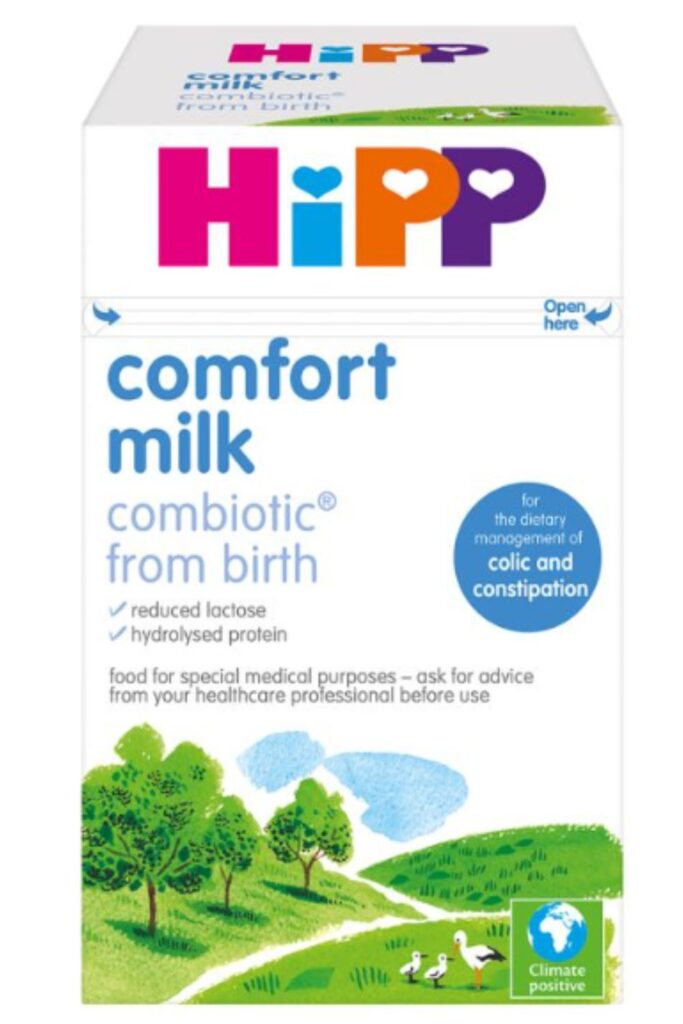
HiPP UK Combiotic Comfort formula is tailored to alleviate digestive issues in babies, with reduced lactose and hydrolyzed proteins.
Why we chose it.
We selected HiPP UK Combiotic Comfort because of its specialized formulation that addresses multiple common digestive problems in infants, such as colic, bloating, and constipation.
This particular formula stands out because it not only has a significantly lower lactose content compared to traditional formulas, making it easier to digest for those with lactose sensitivities but also utilizes hydrolyzed proteins, same as the previous one.
The addition of prebiotics like galacto-oligosaccharides (GOS) further supports gut health and can improve stool consistency. Another noteworthy feature is its unique fat composition mirroring the structure found in breast milk, promoting better fat absorption and digestion for infants.
We put Hipp UK comfort second because it does not add probiotics, like its german version.
Pros
- Easier on sensitive digestive systems due to reduced lactose and hydrolyzed proteins
- Prebiotic content encourages the establishment of beneficial gut bacteria
- Includes important vitamins and LCPs similar to those in breast milk
Cons
- Same as the previous one: availability
3. Nannycare

Nannycare is a nutritionally complete goat milk formula that’s easy to digest and promotes better sleep with high levels of tryptophan.
Why we chose it.
Nannycare has been included in our list as one of the best lactose-containing options for babies who may experience sensitivities or digestive issues with cow’s milk formula.
It uses whole milk and adds prebiotics.
Goat’s milk is naturally easier to digest due to its unique composition and gentler impact on the digestive system, which can be especially beneficial for infants struggling with acid reflux.
The presence of tryptophan in higher amounts than typically found in cow’s milk formulas is particularly advantageous for improving sleep patterns through natural melatonin production. This makes Nannycare a potential lifesaver for parents dealing with restless nights.
Moreover, this formula meets legislative requirements by including DHA (Docosahexaenoic Acid) and ARA (Arachidonic Acid), essential fatty acids that play a vital role in the mental development of infants.
Pros
- Easier digestion due to the natural properties of goat’s milk
- High levels of tryptophan support better sleeping patterns
- MFGM (Milk Fat Globule Membrane)
Cons
- Availability and price
- It’s not organic
4. Kendamil Goat
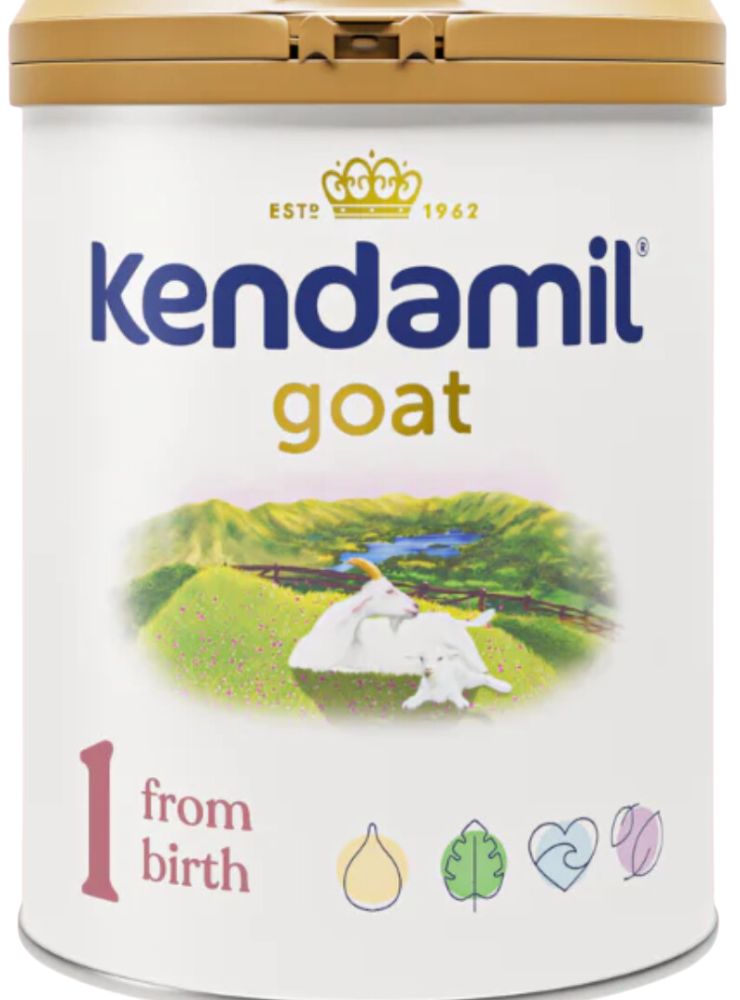
Kendamil Goat is a vegetarian, whole goat milk-based formula with A2 proteins and essential fatty acids for easy digestion.
Why we chose it.
Kendamil Goat embodies the whole-food philosophy in infant nutrition by using whole cream A2 goat milk as its base, aligning perfectly with parents seeking a more natural formula option.
The inclusion of A2 casein offers a comforting alternative for babies who may have difficulties digesting the more common A1 protein in regular cow’s milk.
Using whole goat milk also results in softer curds in an infant’s stomach, suggesting improved digestive comfort and fewer gastrointestinal upsets. Read: Goat Milk vs Cow Milk formula
Adding GOS prebiotics further nurtures healthy gut bacteria, aiding in better digestion and nutrient absorption.
The use of whole milk means less processed vegetable oils, which is a huge plus.
Pros
- Whole goat’s milk and MFGM
- Includes prebiotics to support digestive health
- Ethically sourced Omega 3 and certified vegetarian ingredients
Cons
- Availability and price
Other Goat Milk Formulas to consider are Holle, Hipp, Kabrita, and Jovie.
Best Lactose-Free Formulas
1. Similac Pro-Total Comfort

Similac Pro-Total Comfort is a gentle, partially hydrolyzed protein formula designed for sensitive babies with added 2′-FL HMO prebiotics for immune support.
Why we chose it.
Similac Pro-Total Comfort is on our list due to its unique formulation aimed at infants who struggle with common milk-based formulas.
This product features partially hydrolyzed whey protein, simplifying the digestion process for babies experiencing fussiness, gas, or crying due to gastrointestinal discomfort.
Pro-Total Comfort includes 2’-Fucosyllactose (2’-FL), a human milk oligosaccharide (HMO), not directly obtained from human milk but designed to mimic its immune-supporting properties—making it unique among non-breastmilk options.
The presence of additional prebiotics like short-chain fructooligosaccharides adds another layer of digestive health benefits by favoring beneficial gut flora growth.
Parental feedback suggests improvements in their infants’ comfort after transitioning to this gentle formula, indicating a positive response from sensitive tummies.
Pros
- Eases digestion with partially hydrolyzed protein sources
- Prebiotic content similar to that found in breast milk for immune support
- Non-GMO ingredients appeal to health-conscious families
Cons
- Contains soy oil and sugar
- Not organic
2. Enfamil Neuropro Gentlease
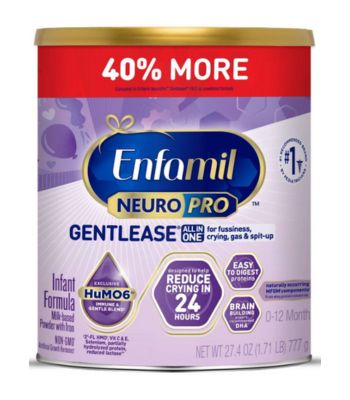
Enfamil Neuropro Gentlease is a milk-based formula for cognitive development with added MFGM and Omega 3 DHA.
Why we chose it.
Enfamil NeuroPro Gentlease makes the list as a standout option due to its unique blend of ingredients that seek to nourish while offering comfort to sensitive infants.
Its protein profile is specifically engineered to be gentle on little tummies, addressing fussiness, gas, and discomfort without sacrificing nutritional value.
MFGM (Milk Fat Globule Membrane) is a critical inclusion in this formula, a complex mix of lipids and proteins vital for brain structure and function, closely mimicking those naturally found in breast milk.
The presence of human milk oligosaccharides (2’-FL HMO), along with additional types of prebiotics like galactooligosaccharides and polydextrose, reinforces early-life immunity while promoting healthy gut flora.
Pros
- Easy-to-digest protein blend can reduce digestive upset
- Includes MFGM component which may support mental development akin to breast milk
- Prebiotic blend favors immune health by supporting the growth of beneficial gut bacteria
Cons
- Contains soy oil, which some parents might prefer to avoid
- Uses corn syrup solids
- Not organic
3. Similac Alimentum
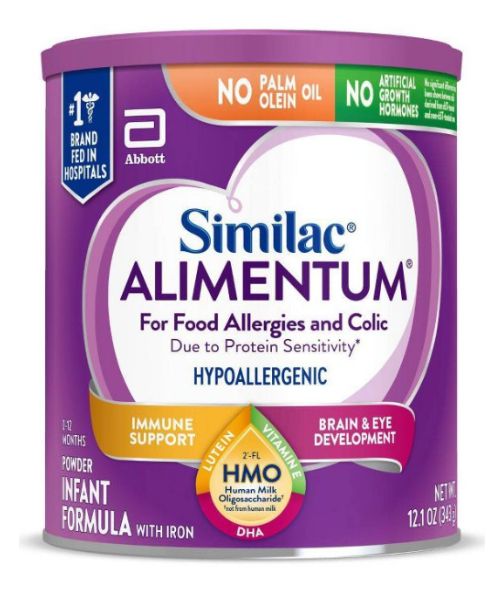
Similac Alimentum is a hypoallergenic infant formula designed to reduce colic symptoms due to protein sensitivity, with added 2’-FL HMO for immune support.
Why we chose it.
Similac Alimentum is a top choice for infants battling hypersensitivity to the proteins found in regular cow’s milk formula.
The formula uses extensively hydrolyzed protein (casein hydrolysate), significantly reducing the potential for allergic reactions by breaking down proteins into tiny fragments that are easier to digest and less likely to trigger an immune response. Read: Hydrolyzed Formulas
The addition of 2’-FL HMO further solidifies its place on this list as this component is structurally similar to the oligosaccharides found in human milk; this prebiotic has been associated with supporting immune system development in infants.
Parents often report a swift reduction in colic symptoms tied to protein sensitivities after introducing Similac Alimentum—sometimes within 24 hours—which can be a crucial factor in choosing a hypoallergenic formula.
Pros
- Rapid symptom relief for infants with protein allergies
- Hypoallergenic nature decreases the risk of allergic reactions
- Contains vital nutrients like DHA and ARA alongside prebiotics
Cons
- Uses soy oil
- Not organic
Last Words
We hope this post helps you choose the best formula for your baby without lactose or low lactose.
If you still have doubts or do not know where to start, do not hesitate to comment below or contact us at [email protected] or [email protected], and we’ll be happy to help you.
Happy feeding!
We’re Maria and Alberto, a married couple and educators who are nutrition enthusiasts. Even before we had kids, we were already crazy about nutrition.
We’d read scientific articles, watch videos from nutritionists, and spend hours listening to nutrition podcasts.
Today, we continue doing this, but in a different way, as we’ve learned to sift through the noise and trends. Nutrition, like any other field of knowledge, the more you read and learn, the more you develop a comprehensive understanding of reality, and that’s what has happened to us.
Before having our first child, we focused on learning everything we could about child nutrition, using the same techniques we had already employed, backed by our extensive knowledge in nutrition.
Our mission is to help other parents with their children’s nutrition, to help them become the best versions of themselves.
If we are what we eat and drink, which is absolutely true, let’s do it right!
